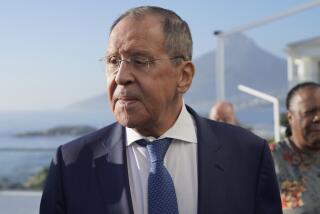Zulu Chief to Shun S. Africa Constitutional Talks : Apartheid: Buthelezi says organizers snubbed the Zulu king. His decision is a setback, but it won’t delay Friday’s opening.
- Share via
JOHANNESBURG, South Africa — Two days before the launch of South African constitutional negotiations, Zulu Chief Mangosuthu Gatsha Buthelezi dealt the historic talks a blow Wednesday night with a surprise announcement that he will not attend.
He was angered by a decision not to allow Zulu King Goodwill Zwelithini a full voting delegation at the talks. The king, like other leaders of black ethnic groups, was invited only as an observer.
“This amounts to an insult to the dignity of His Majesty the King and I simply cannot endorse this by attending with the knowledge that the king has been snubbed,” said Buthelezi, a member of the royal family.
His withdrawal reflected his growing frustration with preliminary rounds of the talks, guided by agreements between the government and Buthelezi’s rival, the African National Congress.
Zach de Beer, chairman of the steering committee, said Buthelezi’s decision will not delay the Friday opening of negotiations, which are being called the Convention for a Democratic South Africa. “I’m sorry this has taken place,” De Beer said. “But I do not believe it does any great harm to the status of (the convention) as a real national movement.”
Buthelezi’s Inkatha Freedom Party has accepted an invitation to the convention, but an Inkatha spokeswoman said that the party delegation will discuss today whether to attend.
The convention, set to open with a two-day session this weekend and continue into next year, has been lauded worldwide as the first step toward ending South Africa’s racial strife and writing a new constitution that grants the black majority its first vote in national affairs.
But the process is under threat from left and right. Radical black groups have declined to attend, arguing that the convention is not a democratically constituted body. And right-wing white groups, which account for about a third of the white electorate, have decided to boycott the talks.
Some political analysts believe that Buthelezi’s last-minute decision to withdraw from the talks is an attempt to force the convention to regard him as a major player in the negotiations, equal in status to the government and Nelson Mandela’s ANC. Buthelezi has felt increasingly powerless in the negotiation process and has tried to whip up Zulu nationalism in recent days by suggesting that the ANC and the government are conspiring to deny Zulus a say in the country’s future.
Although the country’s 7 million Zulus make up the largest black ethnic group, less than a third are members of Buthelezi’s Zulu-based Inkatha and many support the ANC. Besides being president of Inkatha and a traditional Zulu chief, Buthelezi is leader of the self-governing homeland territory of Kwazulu.
He had demanded that the steering committee allow the Zulu king and the Kwazulu homeland government separate voting delegations at the talks. He contended that the king, as the traditional leader of the Zulus, and the homeland, as the ancestral home of the ethnic group, are independent of Inkatha and have a vital role in decisions affecting the country’s future.
But the steering committee decided against granting separate voting status to any ethnic leader or homeland government, although leaders of all nine homelands, like Buthelezi, were invited as representatives of their homeland political parties.
President Frederik W. de Klerk’s government will not have voting status, either, although it will be represented at the table by the ruling National Party, whose delegation includes government Cabinet ministers.
The voting status of delegations is not considered important, though, because convention decisions will be made by the principle of “sufficient consensus,” meaning, in effect, agreement by the two most important negotiators--the ANC and the ruling National Party.
While convention decisions will not be legally binding, participants have agreed to commit themselves to doing everything in their power to implement its resolutions.
Buthelezi is considered an important figure in the country’s future. His support for free-market economics and long opposition to ANC’s sanctions campaign and guerrilla war have made him a mortal enemy of the ANC and a favorite of many white South Africans.
But it is the role of his supporters in the factional violence in South Africa that has elevated him to a key position in the country’s prospects for peace. More than 1,500 blacks have been killed in fighting between Zulu supporters of Inkatha and Zulu supporters of the ANC in Natal province this year; hundreds more have died in fighting between migrant Zulu workers and ANC supporters in Johannesburg-area townships.
Buthelezi’s organization also has been racked by recent revelations that the white government helped pay for several Inkatha political rallies. Although the government’s fondness for Inkatha was well-known, the payments suggest that Inkatha was being propped up by the government in the hope of countering the broad support among blacks for the ANC.
More to Read
Sign up for Essential California
The most important California stories and recommendations in your inbox every morning.
You may occasionally receive promotional content from the Los Angeles Times.














